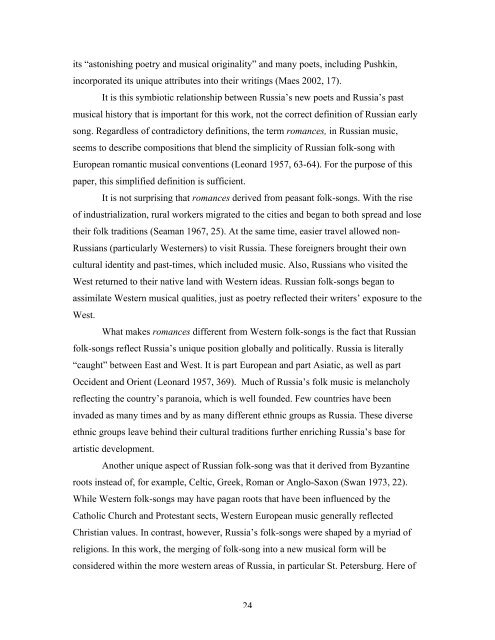Alexander Pushkin's Influence on Russian Ballet
Alexander Pushkin's Influence on Russian Ballet
Alexander Pushkin's Influence on Russian Ballet
Create successful ePaper yourself
Turn your PDF publications into a flip-book with our unique Google optimized e-Paper software.
its “ast<strong>on</strong>ishing poetry and musical originality” and many poets, including Pushkin,<br />
incorporated its unique attributes into their writings (Maes 2002, 17).<br />
It is this symbiotic relati<strong>on</strong>ship between Russia’s new poets and Russia’s past<br />
musical history that is important for this work, not the correct definiti<strong>on</strong> of <strong>Russian</strong> early<br />
s<strong>on</strong>g. Regardless of c<strong>on</strong>tradictory definiti<strong>on</strong>s, the term romances, in <strong>Russian</strong> music,<br />
seems to describe compositi<strong>on</strong>s that blend the simplicity of <strong>Russian</strong> folk-s<strong>on</strong>g with<br />
European romantic musical c<strong>on</strong>venti<strong>on</strong>s (Le<strong>on</strong>ard 1957, 63-64). For the purpose of this<br />
paper, this simplified definiti<strong>on</strong> is sufficient.<br />
It is not surprising that romances derived from peasant folk-s<strong>on</strong>gs. With the rise<br />
of industrializati<strong>on</strong>, rural workers migrated to the cities and began to both spread and lose<br />
their folk traditi<strong>on</strong>s (Seaman 1967, 25). At the same time, easier travel allowed n<strong>on</strong>-<br />
<strong>Russian</strong>s (particularly Westerners) to visit Russia. These foreigners brought their own<br />
cultural identity and past-times, which included music. Also, <strong>Russian</strong>s who visited the<br />
West returned to their native land with Western ideas. <strong>Russian</strong> folk-s<strong>on</strong>gs began to<br />
assimilate Western musical qualities, just as poetry reflected their writers’ exposure to the<br />
West.<br />
What makes romances different from Western folk-s<strong>on</strong>gs is the fact that <strong>Russian</strong><br />
folk-s<strong>on</strong>gs reflect Russia’s unique positi<strong>on</strong> globally and politically. Russia is literally<br />
“caught” between East and West. It is part European and part Asiatic, as well as part<br />
Occident and Orient (Le<strong>on</strong>ard 1957, 369). Much of Russia’s folk music is melancholy<br />
reflecting the country’s paranoia, which is well founded. Few countries have been<br />
invaded as many times and by as many different ethnic groups as Russia. These diverse<br />
ethnic groups leave behind their cultural traditi<strong>on</strong>s further enriching Russia’s base for<br />
artistic development.<br />
Another unique aspect of <strong>Russian</strong> folk-s<strong>on</strong>g was that it derived from Byzantine<br />
roots instead of, for example, Celtic, Greek, Roman or Anglo-Sax<strong>on</strong> (Swan 1973, 22).<br />
While Western folk-s<strong>on</strong>gs may have pagan roots that have been influenced by the<br />
Catholic Church and Protestant sects, Western European music generally reflected<br />
Christian values. In c<strong>on</strong>trast, however, Russia’s folk-s<strong>on</strong>gs were shaped by a myriad of<br />
religi<strong>on</strong>s. In this work, the merging of folk-s<strong>on</strong>g into a new musical form will be<br />
c<strong>on</strong>sidered within the more western areas of Russia, in particular St. Petersburg. Here of<br />
24

















